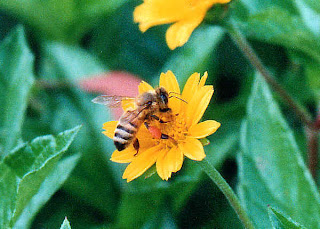
In 24 states throughout the USA, beekeepers have noticed their bees have been disappearing inexplicably at an alarming rate, threatening not only their livelihoods but also the production of numerous crops, including California almonds, one of the nation’s most profitable.
The sudden mysterious losses are highlighting the critical link that honeybees play in the long chain that gets fruit and vegetables to supermarkets and dinner tables across the country.
Beekeepers have fought regional bee crises before, but this is the first national affliction.
Now, in a mystery worthy of Agatha Christie, bees are flying off in search of pollen and nectar and simply never returning to their colonies. And nobody knows why. Researchers say the bees are presumably dying in the fields, perhaps becoming exhausted or simply disoriented and eventually falling victim to the cold.
As researchers scramble to find answers to the syndrome they have decided to call “colony collapse disorder,” growers are becoming openly nervous about the capability of the commercial bee industry to meet the growing demand for bees to pollinate dozens of crops, from almonds to avocados to kiwis.
Along with recent stresses on the bees themselves, as well as on an industry increasingly under consolidation, some fear this disorder may force a breaking point for even large beekeepers.
A Cornell University study has estimated that honeybees annually pollinate more than $14 billion worth of seeds and crops in the United States, mostly fruits, vegetables and nuts. “Every third bite we consume in our diet is dependent on a honeybee to pollinate that food,” said Zac Browning, vice president of the American Beekeeping Federation.
The bee losses are ranging from 30 to 60 percent on the West Coast, with some beekeepers on the East Coast and in Texas reporting losses of more than 70 percent; beekeepers consider a loss of up to 20 percent in the offseason to be normal.To cope with the losses, beekeepers have been scouring elsewhere for bees to fulfill their contracts with growers.
The sudden mysterious losses are highlighting the critical link that honeybees play in the long chain that gets fruit and vegetables to supermarkets and dinner tables across the country.
Beekeepers have fought regional bee crises before, but this is the first national affliction.
Now, in a mystery worthy of Agatha Christie, bees are flying off in search of pollen and nectar and simply never returning to their colonies. And nobody knows why. Researchers say the bees are presumably dying in the fields, perhaps becoming exhausted or simply disoriented and eventually falling victim to the cold.
As researchers scramble to find answers to the syndrome they have decided to call “colony collapse disorder,” growers are becoming openly nervous about the capability of the commercial bee industry to meet the growing demand for bees to pollinate dozens of crops, from almonds to avocados to kiwis.
Along with recent stresses on the bees themselves, as well as on an industry increasingly under consolidation, some fear this disorder may force a breaking point for even large beekeepers.
A Cornell University study has estimated that honeybees annually pollinate more than $14 billion worth of seeds and crops in the United States, mostly fruits, vegetables and nuts. “Every third bite we consume in our diet is dependent on a honeybee to pollinate that food,” said Zac Browning, vice president of the American Beekeeping Federation.
The bee losses are ranging from 30 to 60 percent on the West Coast, with some beekeepers on the East Coast and in Texas reporting losses of more than 70 percent; beekeepers consider a loss of up to 20 percent in the offseason to be normal.To cope with the losses, beekeepers have been scouring elsewhere for bees to fulfill their contracts with growers.
Lance Sundberg, a beekeeper from Columbus, said he spent $150,000 in the last two weeks buying 1,000 packages of bees — amounting to 14 million bees — from Australia.
He is hoping the Aussie bees will help offset the loss of one-third of the 7,600 hives he manages in six states. “The fear is that when we mix the bees the die-offs will continue to occur,” Mr. Sundberg said.
He is hoping the Aussie bees will help offset the loss of one-third of the 7,600 hives he manages in six states. “The fear is that when we mix the bees the die-offs will continue to occur,” Mr. Sundberg said.






No comments:
Post a Comment